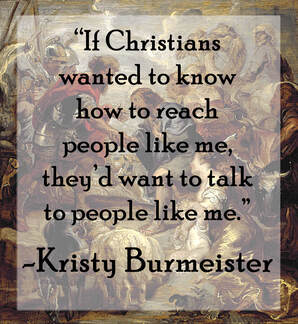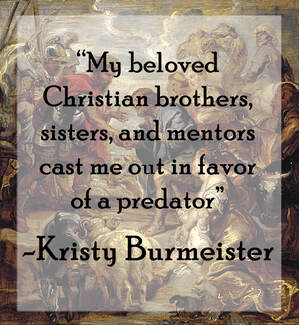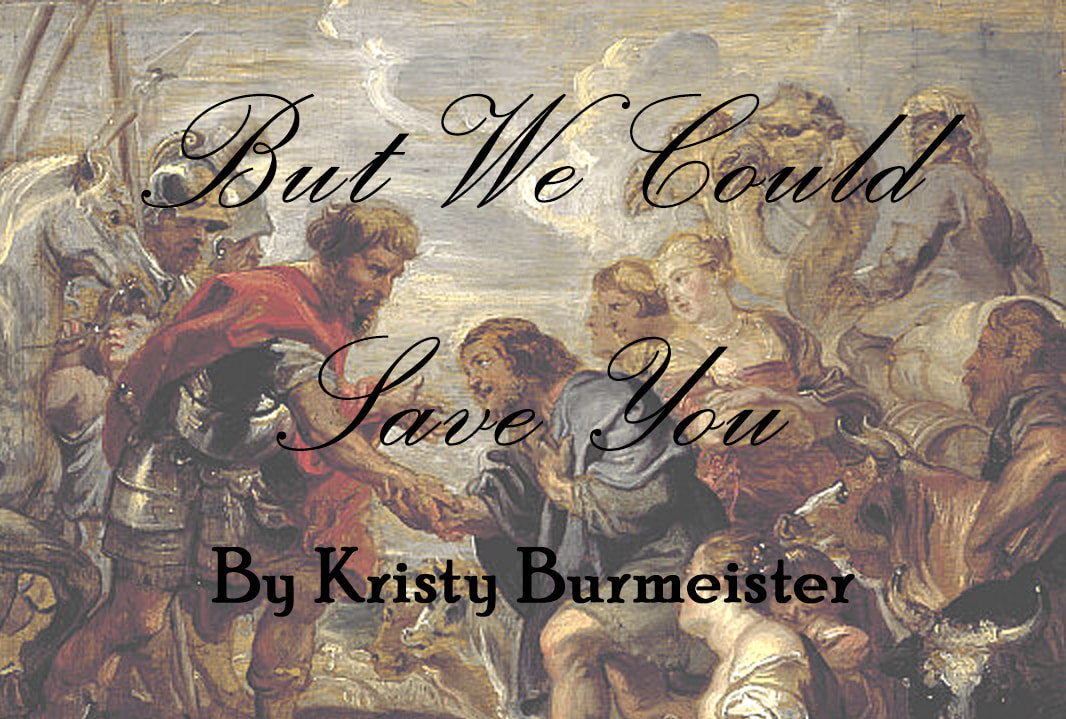|
-Kristy Burmeister- Then Jesus told them this parable: “Suppose one of you has a hundred sheep and loses one of them. Doesn’t he leave the ninety-nine in the open country and go after the lost sheep until he finds it? And when he finds it, he joyfully puts it on his shoulders and goes home. Then he calls his friends and neighbors together and says, ‘Rejoice with me; I have found my lost sheep.’ I tell you that in the same way there will be more rejoicing in heaven over one sinner who repents than over ninety-nine righteous persons who do not need to repent. – Luke 15:3-7 In 2012, I was in my early 30s, living in a new state, starting a new job, and raising two young daughters who were just getting old enough to ask questions about God. Although I’d severed ties with Christianity in my teens, I wanted to answer their questions responsibly, without exposing them to my own cynicism. They had the right to make up their own minds. I bought a couple of books and a Bible, just to give myself a little refresher. Around that time, someone added me to an online Bible discussion group on Facebook. When I joined the group, I made it clear that I had a lot of issues with Christianity. I was assured by the group that they wanted me there.  A few months later, we got into a discussion about ministries that reach out to the unchurched. As I was the only person in the group who was “unchurched” at that time, I felt I had a lot to offer in that conversation. If Christians wanted to know how to reach people like me, they’d want to talk to people like me. Instead, the discussion devolved into many of the group members complaining about new people coming into their churches and not following all the “rules”—both written and unwritten. They didn’t want to change anything about their worship services to make it easier for new people to join in. They didn’t want to do outreach to “those people” who might cuss or have tattoos. They wanted to sit in their clean sanctuary, sing the songs they liked best, and hear the pastor tell them what good Christian folk they were for following all the rules. I pointed out that not loving the unchurched enough to be uncomfortable wasn’t following the rules of Christianity. I brought up the Parable of the Good Shepherd. Shouldn’t every one of them want to bring that lost sheep home? No, they said. They wouldn’t leave the safety of the herd to go after one lost sheep. More than that, they didn’t want their pastor to go out there and find that lost sheep either. It was unacceptable for any church resources—including time—to be used on the lost. All the church’s resources should be spent on people who were already in the church. It’s important to point out that this group was mostly made up of fundamentalist evangelicals who believe you must be saved to get into Heaven. What they were effectively telling me is their own comfort was more important than my immortal soul. They didn’t want the likes of me in their churches. Sure, it was fine for me to be in some online group with them, but they didn’t want me in their church. I used to be in a church. I grew up in the Mennonite and Mennonite-Brethren denominations. I went to church every Sunday. I attended youth group every week. I led Bible studies both at church and at my high school. I came up with the plan to start a bi-weekend youth service as an outreach program to our town, which we did. I went on short-term mission trips. I saw my friends at the pole. I signed a purity pledge. I followed every single rule, and then some. When I was eighteen, a middle-aged man from my church began stalking and threatening me. It got so bad, I had to stop attending my church in order to avoid him. My church council refused to ask that man to attend somewhere else, so I had no other option.  My beloved Christian brothers, sisters, and mentors cast me out in favor of a predator. It didn’t matter that I had been everything they wanted me to be. I had more than fulfilled every expectation. The hard truth was that my situation made them uncomfortable, and they didn’t want to face that discomfort. If I just quietly stopped attending, the whole problem could be swept under the rug. No need to change anything. They could go about business as usual. That damaged me more than the trauma of having my life threatened. We all know evil is in the world. I could have coped with knowing one man wanted to do evil to me easier than dealing with the cognitive dissonance of knowing the same people who claimed to love me, who had witnessed my baptism and welcomed me as a full member, who I knew to be “good Christians” threw me under the bus so they wouldn’t have to do something that made them uncomfortable. I’ve repeatedly gotten the same message from Christians: We don’t want you. You have no value to us beyond an attendance number. Not only do they not want me, they don’t want to listen to me. They all want to believe they’re the type of Christians who would have stood up to my stalker, but if they’re the type of Christians who aren’t willing to face some uncomfortable truths about the church, how could they have? People who are still inside the church want to know why attendance has declined. They ask, “How can we reach the unchurched?” But as soon as one of us speaks up, they put their hands over their ears. I’m literally right here, telling you how to fix this, but you don’t want to hear it. You don’t want to hear it because it requires you to change and act. A couple of years after that Facebook group dismissed people like me, I met Rev. Melissa Fain in a different online community. I read some of her posts on Fig Tree, and she struck me as someone who might understand. Then she did something that blew my little unchurched socks off. She asked me to contribute to an Advent devotional. Here was an actual pastor, and she wasn’t just saying, “Hey, I want your body to take up space in the church so we can show we’re growing.” She wasn’t even asking me to join anything. She wanted to hear what I had to say. She valued what I had to say. As I wrote in my memoir about my traumatic experiences within the church, that was the first time since I’d been forced to leave my childhood church that I’d felt wanted by Christians. Not tolerated. Wanted. Valued, not as a number, but as a person who had an important perspective the church should hear about. We like to look at people outside the church as projects. We’re going to bring them into the church and save them from all their misery. You’re not going to save people like me. You don’t even actually want us, evidenced by how little you’re willing to flex to reach us. But we could save you, if you let us. |
Categories
All
Archives
October 2023
|




 RSS Feed
RSS Feed